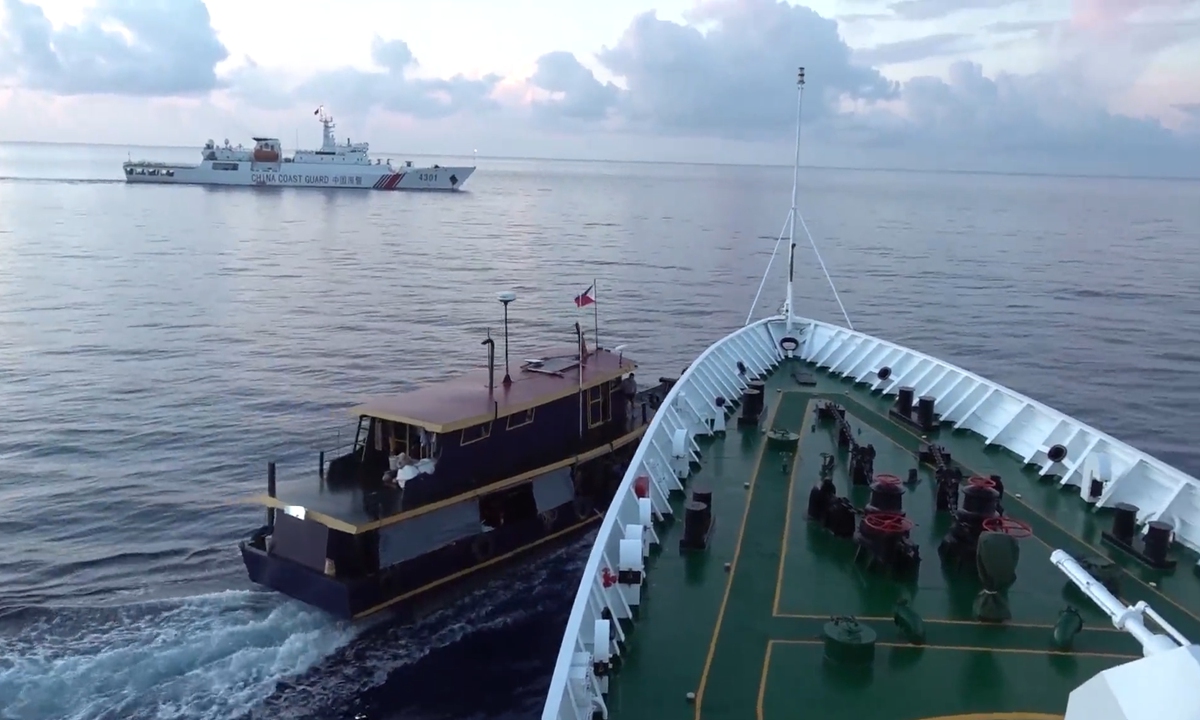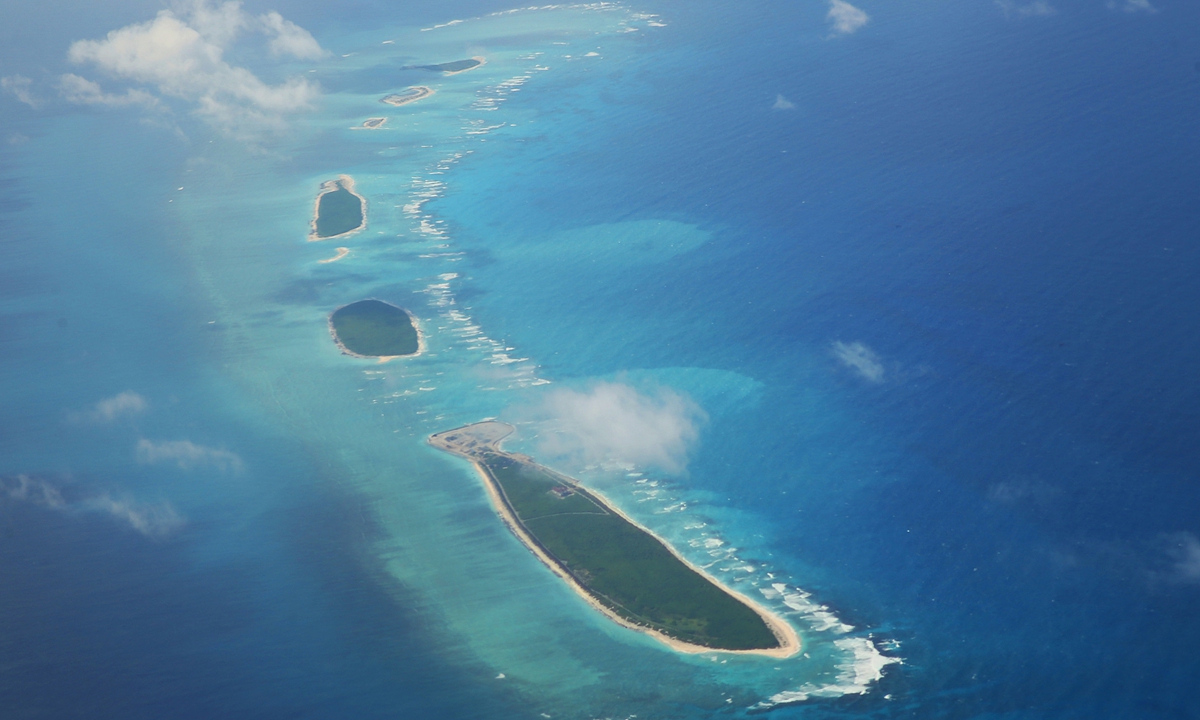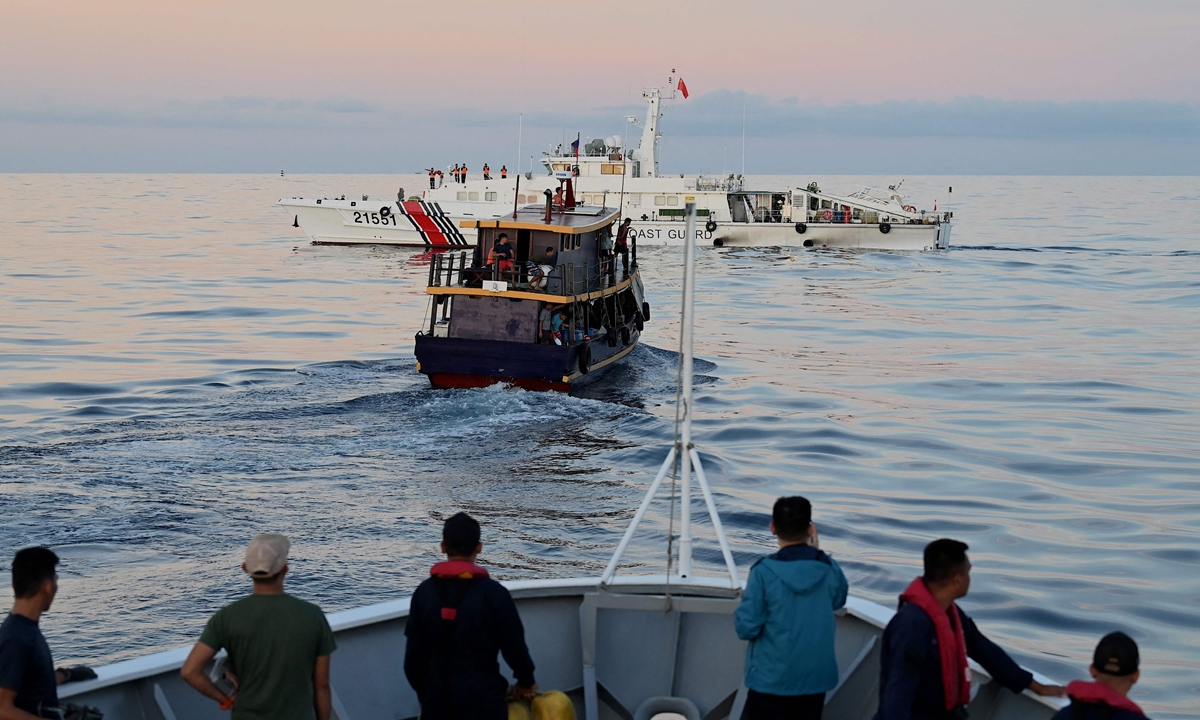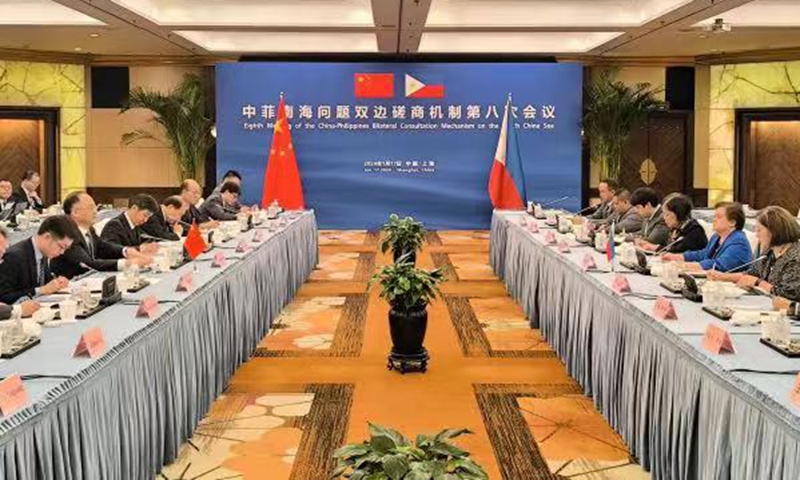Philippines' Marcos kicks off Vietnam visit with S.China Sea maritime cooperation in focus
More conflicts to rise if coast guard deal harms China’s interests: experts

A Philippine vessel approaches a China Coast Guard vessel in a dangerous manner and leads to a bump in waters off China's Ren'ai Reef in the Nansha Islands in the South China Sea on October 22, 2023. Photo: Screenshot from a video released by China Coast Guard
Philippine President Ferdinand Romualdez Marcos left for Vietnam on Monday for a two-day state visit, which is anticipated to mainly focus on the agriculture sector and coast guard cooperation, against the backdrop of the tensions in the South China Sea provoked by Manila.Chinese experts said on Monday China is always open to cooperation among ASEAN member countries that is conducive to regional development and stability, while strongly opposes "cooperation" that targets a third party and harms others' interests. If Vietnam and the Philippines cooperate in certain areas to the detriment of China's interests in the South China Sea, it will only irritate the situation in the South China Sea and make the risk of conflict higher.
According to the Voice of Vietnam, Marcos' first-ever Vietnam trip since his inauguration in 2022 aims to reaffirm the strategic partnership between the two countries, strengthen political trust at the highest level, and create momentum to bolster bilateral cooperation.
Before Marcos' departure, he said in a speech on Monday that he will discuss with his counterpart, Vietnamese President Vo Van Thuong, cooperation in trade and investments, education, and tourism, as well as "regional and multilateral issues of mutual concern."
Calling the state visit to bring the relations between the Philippines and Vietnam to "greater heights," Marcos is also scheduled to meet Vietnamese Prime Minister Pham Minh Chinh and Chairman of the National Assembly Vuong Dinh Hue.
According to the GMA Network, Marcos will also meet with the business sector to explore how his country can further strengthen trade and investment between the Philippines and Vietnam.
Before Marcos' departure to Vietnam, the Philippine Coast Guard said the two countries will sign a memorandum of understanding on cooperation between their coast guard forces, "toward promoting, preserving, and protecting mutual interest," according to the CNN Philippines.
In particular, the discussions will center on marine environmental protection, search and rescue, as well as setting "hotline" of communication for easier coordination.
Gu Xiaosong, dean of the ASEAN Research Institute of Hainan Tropical Ocean University, told the Global Times on Monday that Vietnam and the Philippines are both ASEAN member countries and it is normal for them to interact with each other and strengthen bilateral exchanges and cooperation.
"As for the possible signing of a coast guard agreement between the two countries, if it is for the sake of maintaining peace and stability in the South China Sea, China is also open to it," Gu said, "However, if the coast guard agreement is used against China, China will firmly oppose it."
Chen Xiangmiao, director of the World Navy Research Center at the National Institute for South China Sea Studies, told the Global Times on Monday that China, Vietnam, and the Philippines have overlapping claims in some of the South China Sea regions. The Philippine and Vietnamese coast guard cooperation is based on the mutual recognition of the enforcement of the waters, which means that China's sovereignty claims are excluded and ignored, said Chen.
"If Chinese fishing vessels run into waters claimed by China, which the Philippines and Vietnam also claimed, then it will put more pressure and cost on our maritime rights protection, because the Vietnam and Philippines coast guards could share information and cooperate in law enforcement based on their agreement."
China is open to closer economic, trade and food security cooperation between Vietnam and the Philippines, as it is conducive to the economic and industrial cooperation of the whole region, said Chen.
However, if their cooperation harms the interests of third parties, including China, it will only deteriorate the situation in the South China Sea, making the risk of possible conflict greater, said Chen.
Position of Vietnam
Before Marcos' visit, in December 2023, Chinese President Xi Jinping concluded a successful visit to Vietnam. Leaders of the two countries held in-depth and candid exchange of views on maritime issues during the visit, with both sides stressing the need to better manage and actively resolve maritime disputes, so as to safeguard peace and stability in the South China Sea.
China has been Vietnam's largest trading partner for many years, and Vietnam is China's largest trading partner in ASEAN, with bilateral trade volume exceeded $200 billion for two consecutive years, according to data from the Chinese Ministry of Commerce in 2023.
The Philippines is Vietnam's 16th largest trading partner, and the largest export market for Vietnamese rice. The Philippines and Vietnam aim to boost bilateral trade by up to 10 billion in 2024, according to media reports.
China and Vietnam have enjoyed closer ties in recent years. "China and Vietnam share a land border, and the two countries have close political, economic and cultural exchanges," Gu said.
Both countries are led by a Communist Party and enjoy good-neighborly friendship, which makes it unlikely for Vietnam to join other countries against Beijing on the South China Sea dispute at present. And in the long run, much remains to be seen as Vietnam-Philippines relations deepen, Gu said.
Despite the South China Sea disputes between Vietnam and China, Vietnam's South China Sea policy is also multi-faceted, and it also emphasizes cooperation with China on the South China Sea issue, Chen remarked.
There is no doubt that a strained relationship with China is not conducive to Vietnam's economic development and social stability, Gu noted.
Although the Philippines and Vietnam have a common interest in advancing the development of oil, gas and fishery resources in the disputed waters, divergences remain as well, said Chen. "The Philippines has a military alliance with the US, and it will be more dependent on the US, which has never given up its efforts to 'peacefully evolve' Vietnam."
Vietnam highly regards its diplomatic autonomy, so it is unlikely that Vietnam will be led by the Philippines on the South China Sea issue. But there may be mutual influence and coordination between the two sides, Chen noted.




